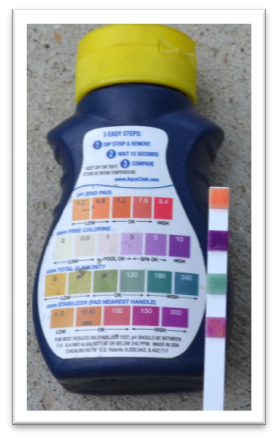 Balancing your pool water is an easy practice. It requires little-to-no knowledge of chemistry. The secret to keeping your pool water balanced is maintaining the relationship between the different chemicals present in the water. Your pool changes year round. Various things affect the pool water; things like rain, swimmers, heat, debris, and algae. Most likely you will not change the water in your pool for years- the trick is continuous filtration and water balancing. A pool that is considered ‘balanced’ has proper levels of pH, total alkalinity, and calcium hardness. We will discuss what each of those things means.
Balancing your pool water is an easy practice. It requires little-to-no knowledge of chemistry. The secret to keeping your pool water balanced is maintaining the relationship between the different chemicals present in the water. Your pool changes year round. Various things affect the pool water; things like rain, swimmers, heat, debris, and algae. Most likely you will not change the water in your pool for years- the trick is continuous filtration and water balancing. A pool that is considered ‘balanced’ has proper levels of pH, total alkalinity, and calcium hardness. We will discuss what each of those things means.
Water has a unique property. It will dissolve and hold minerals until it becomes completely saturated and cannot hold any more water in the solution. When water is less saturated, it is considered to be corrosive or aggressive. When the water becomes over saturated and can no longer hold minerals in the solution, it is in a scaling condition. Balance water is therefore water that is neither over-saturated or under-saturated.
We recommend always using a high quality test kit when testing your water balance.
What Exactly is pH?
pH is essentially the measurement of how acidic or basic the water is. It is measured on a scale from 0-14, 7 being the neutral number. If your pool’s pH is below 7.0, the water is defined as acidic. Levels above 7 are said to be basic or alkaline. Every element that enters your pool has a pH value. For example, have you ever heard of acid rain? This is rain that has an extremely low pH.
To keep your pool water’s pH levels in order, all you have to do is adjust it with pH increasers or pH decreasers. These are known as bases or acids. The ideal range for your pool is between 7.2-7.8.
We recommend you test your water daily, or at least a few times a week. If the water is showing a level below 7.0, your water is too acidic. You will need to make the proper adjustments to your water by adding some form of pH increaser. Similarly, if your pH is higher than 7.8, you must add an acid to bring down the pH. Too low of a pH can cause pool damage and too high of a pH level can form scale or calcium deposits on tiles or filters.
Understanding Total Alkalinity
Total alkalinity is defined as the ability of the water to resist changes in pH. It measures the carbonates, bicarbonates, hydroxides, and other alkaline substances found in the pool water. Total alkalinity is also known as the buffering capacity of the water. It keeps the pH from bouncing all over the place.
Alkalinity is a very important component of water balance. It should be maintained somewhere in the 810-120ppm range for gunite and concrete pools and between 125-170ppm for painted, vinyl, and fiberglass pools. We recommend testing your total alkalinity weekly.
What is Calcium Hardness?
You may have heard the term ‘scale’ when talking about your pool and your pool water. Scale refers to calcium carbonate which forms from a solution and is deposited on surfaces. It is made up of a combination of carbonate ions and is part of the calcium hardness level. .To test for calcium hardness we measure of hard or soft the water is. Hard water typically has high levels of calcium and magnesium. If the levels get too high the water will become saturated. This will throw off excess particles out of the solution. they will then deposit themselves on any surface in your pool. Usually they are attracted to ladders, lights, and floors.
If the calcium hardness levels get too low, then the water will be under-saturated. If this happens, the water becomes aggressive. It tries to obtain the calcium it need to be more ‘saturated’. This is known as soft water. Soft water can actually corrode surfaces in the pool to obtain its desired level of minerals.
If you test your pool water and find your calcium hardness levels to be too high, there are products designed to treat it. Call us at Ask the Pool Guy for product recommendations! The recommended range for calcium hardness is between 200-400ppm. We recommend you test these levels weekly.
